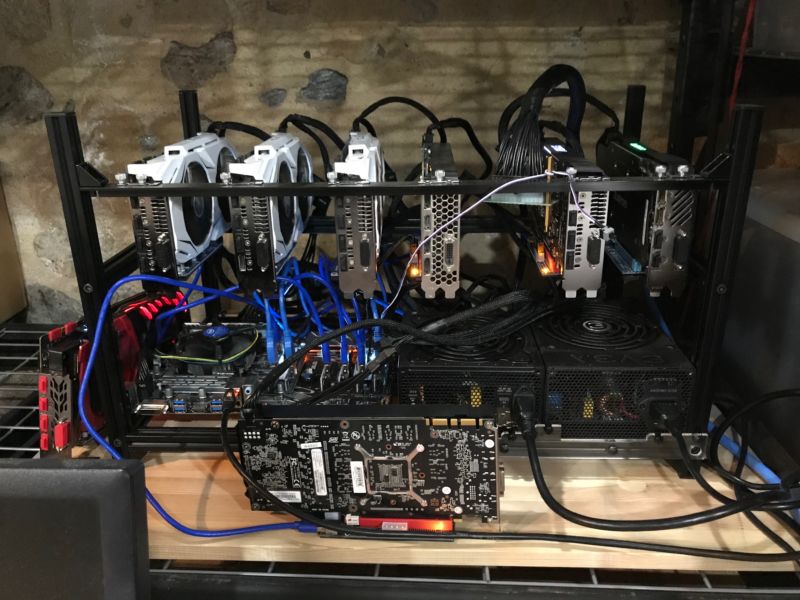
Matthew Freilich
The market for high-end graphics cards used to work like the market for almost any other piece of computer gear. You'd go to your local electronics store, pick one up off the shelf, and pay an amount right around the manufacturer's suggested retail price.
But the rise of cryptocurrency mining has created an unprecedented global shortage of graphics cards. If you go to your local retailer, you're likely to find bare shelves where the beefier cards used to be. Instead of trading at a discount, used cards routinely sell for well above MSRP on sites like eBay and Craigslist.
And it's driving PC gamers—who used to be the primary market for these cards—crazy.
"Cryptocurrency can't crash soon enough," one gamer wrote on the PCGaming subreddit a few days ago. Gamers thinking about building a new gaming machine are being forced to put those plans on hold until the market settles down. Others, who bought high-end graphics cards a few months ago, are wondering if they should sell at a big profit.
Jared Walton of PC Gamer sums up the situation: "It's a terrible time to buy a graphics card."
The graphics card shortage is happening because high-end graphics cards are the best way to mine Ethereum and other non-bitcoin cryptocurrencies. With the price of these cryptocurrencies rising to unprecedented heights in recent weeks, a powerful graphics card can generate several dollars per day in cryptocurrency. And so a growing community of hobbyist miners has been snapping every graphics card it can get, creating shortages and high prices for everyone else.
“It’s not available in any store”
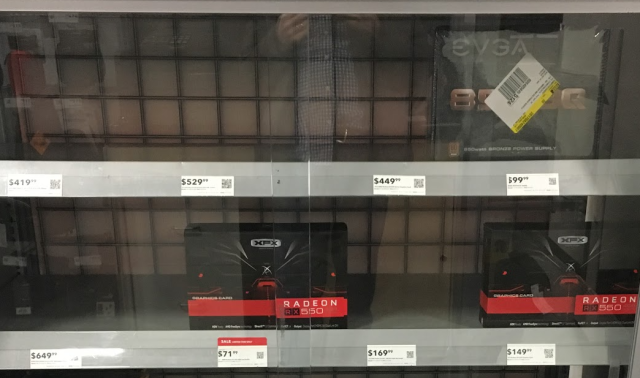
Timothy B. Lee
On Wednesday, I visited my local Best Buy to see the graphics card shortage for myself. A locked cabinet in the gaming section was supposed to hold a wide range of graphics card. But the more expensive ones—cards like the AMD Radeon RX 580 and Nvidia GeForce GTX 1080 that were best suited for cryptocurrency mining—were sold out. All that was available were a handful of low-end graphics cards not suitable for Ethereum mining.
I asked a sales representative to check to see if I could get an RX 580 at another Best Buy store. No luck.
"It's not available in any store," she told me. "It's not online."
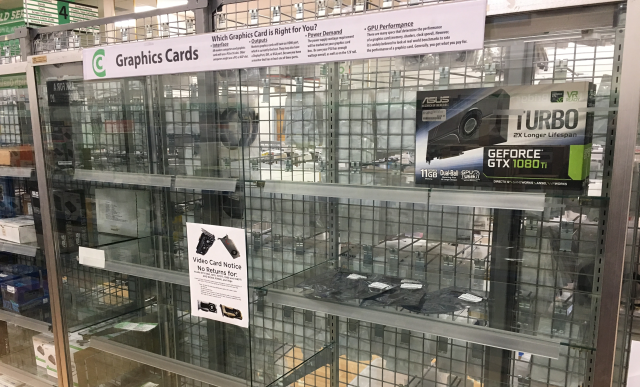
Sullivan McIntyre
I had an experience that's being played out all over the country and around the world. Sullivan McIntyre, a Redditor from San Francisco, sent us this photograph of the graphics card section at Central Computers. Not only are there hardly any graphics cards available for purchase, but the company has notified customers that it is suspending its return policy for graphics cards.
The reason: graphics card prices have been fluctuating wildly.
According to data from PC Part Picker, you could get an AMD Radeon RX 570 for around $200 last spring, while an average RX 580 cost closer to $250. But prices started to rise over the summer, with both cards costing more than $350 by early July. Prices settled down a bit in the fall, but in recent weeks we've seen an even more extreme price rise: RX 580 cards now cost more than $400 on average.
And this chart of average prices understates the degree of price rise because it includes retail stores that tend to sell closer to MSRP and sell out instantly. If you want to get a graphics card in a timely manner, you'll probably be forced to pay even higher prices to online resellers. As we write this on Thursday, resellers on Amazon are asking almost $500 for an RX 570, while some RX 580s are going for more than $600.
The story is similar for the Nvidia GeForce cards that are popular with miners. Average prices for the GTX 1060 have risen from $275 to $400 since May, according to PC Part Picker, while the 1070 has risen from $425 to $600. And again, these averages probably understate the rise, because if you actually want to get a card promptly you might be forced to pay an online reseller significantly more.
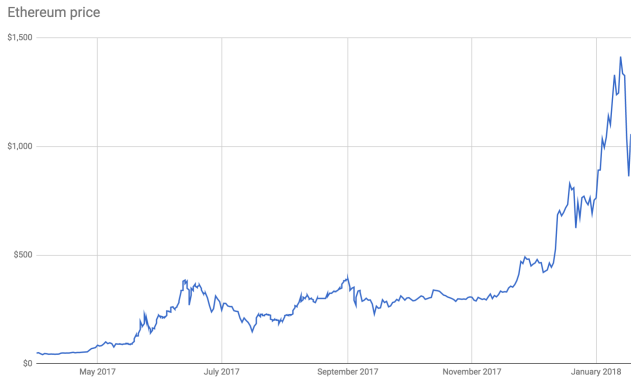
Timothy B. Lee
This pattern correlates closely with changes in the price of Ethereum. Graphics card prices started inching upward around June 2017—the same time Ethereum prices started to soar. The current boom coincides with the even more dramatic Ethereum boom of recent weeks.
The cryptocurrency boom is creating big profit opportunities
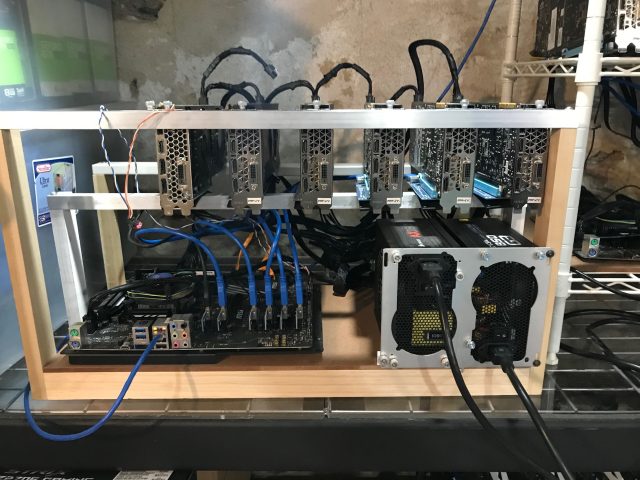
Matthew Freilich
So who's driving all this demand for graphics cards? Cryptocurrency miners. To understand the phenomenon, we talked to people active in cryptocurrency mining, and they all told us similar stories: mining Ethereum and other cryptocurrencies has become hugely profitable in recent months, which is why so many people are racing to expand their mining operations. And getting graphics cards is the main bottleneck.
Bitcoin mining is no longer profitable on consumer graphics cards because people have built sophisticated custom ASIC-based mining equipment that's far more power-efficient. But Ethereum has a memory-hungry mining algorithm that's resistant to ASIC optimization. That means mining Ethereum is still practical with a consumer graphics card if it has at least two gigabytes of memory. Entry-level graphics cards don't have enough memory, but more advanced ones do.
Most of the people we talked to began mining in the summer of 2017—right around the time graphics card prices started to creep upward.
Matthew Freilich is an IT security professional in Philadelphia, and he told Ars that he started his mining activities last June.
"A lot of cryptocurrencies were starting to rise in value, and a really good friend of mine said he was building a cryptocurrency rig," Freilich told Ars. "Once I started talking to him about that more, I started to get really interested in it. I decided I'm going to build one of these also."
Freilich initially bought six NVideo GTX 1070 graphics cards from Dell, which at the time still had cards available for the MSRP of around $400. He also ordered a special motherboard capable of accommodating a large number of graphics cards. Freilich used a mining-centric operating system called PIMP OS.
"It was kind of a turnkey solution," Freilich told Ars. "It has the drivers built in and has compatibility with a lot of the motherboards."
Once he was satisfied with that first rig, Freilich started working on a second one. To get better prices, he began trolling Craigslist for graphics cards. Freilich paid cash and got used—but perfectly functional—GTX 1070s for as little as $300.
When I reached Freilich on Tuesday, he had eight graphics cards in his second rig in addition to the six in his original rig. And he was starting work on a third rig. He had just returned from Best Buy, where he had bought yet another GTX 1070. Freilich had paid $429, which is above MSRP but a bargain in today's market.
"I check online every day pretty much and a couple of times a day" to see if his local Best Buy has graphics cards in stock, he told Ars. "If they have them in stock I'll snag it immediately."
It won't take long for Freilich to earn his money back. "I'm making about $50 per day" across his 14 cards, Freilich says. That works out to around $3.50 per card per day. At that rate, a card will need around four months to pay for itself.
Of course, nothing is that simple. The value of cryptocurrency changes rapidly. In the short run, higher cryptocurrency prices mean that miners earn more for the same effort. But Ethereum (and other blockchain networks) automatically raise the difficulty of the mining problem as more people join the network. So if the mining boom continues, difficulty will rise and Freilich's cards will generate less cryptocurrency per day than they're generating now, cancelling out some of the gains from recent price increases.
Other miners told Ars similar stories. We talked to Zach, a high school student in the Chicago area who also got involved in mining last summer. He was able to find a source that would sell him a couple dozen RX 580 graphics cards for the MSRP around $300. He immediately turned around and re-sold them for $400. Those profits helped to finance investments in still more graphics cards that he put to work mining Ethereum and a lesser-known cryptocurrency called Siacoin.
Edward, a software developer in the Memphis area, told us that he uses Nvidia GTX 1060, 1070, and 1080 cards. When we talked on Tuesday, he said his 1060s (which currently sell for around $400) were earning around $5 per day, per card, while a high-end 1080 (worth upwards of $700) could earn as much as $8 per day.
Chris, a software developer in Salt Lake City, had the largest operation of any of the miners we talked to. He had six mining rigs with six video cards in each—"a mixture of AMD RX 580s, Nvidia 1070 TIs, and a few 1060s."
Mining is a global phenomenon
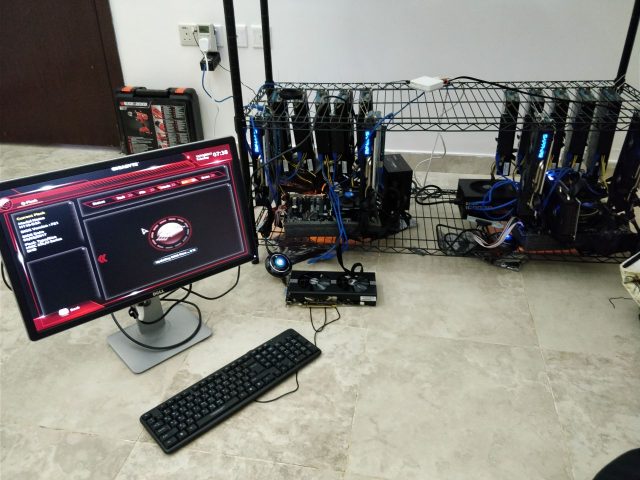
Suleiman Alaquel
Blockchain networks are global, so people are unsurprisingly having similar experiences around the world. Suleiman Alaquel, a software developer from Riyadh, emailed us about his experiences mining cryptocurrency in Saudi Arabia. The kingdom is an attractive place to mine cryptocurrencies because electricity there is cheap. But graphics cards are expensive.
"I went to a store that's well known for PC gamers' tech," Alaquel told us by email. "As soon as I asked for a high-end GPU he said 'you're also one of them miners!' He told me that everything is sold out because of miners!"
A few miners had pre-ordered all of the high-end graphics card shipments the store expected for the next six months, Alaquel said.
He added that you could get high-end graphics cards on the Saudi version of Cragislist, but they were expensive. An AMD Radeon RX 580 goes for around 2,000 Saudi riyal—$530.
A miner in South Korea told us that supplies are less constrained there, perhaps because so much hardware is manufactured in Asia. But graphics card prices were still high.
"Pretty much any computer store will build you a mining rig," he wrote by email. "You choose the card, choose the number of cards, and select where you want them shipped to."
One big difference from the US or Saudi Arabia, he said, is that electric utilities don't allow mining in residential buildings—so miners generally have their rigs shipped directly to commercial hosting facilities.
"One store I was at a couple days ago was processing 17 rigs for one client," the South Korean miner wrote. "When I tried to buy a mining case a few days ago, the store I went to had about 240 in stock, but they were all allocated and being shipped out... Not a single rack for me from that store."
Read More Here's why you can't buy a high-end graphics card at Best Buy : http://ift.tt/2rjW9ETBagikan Berita Ini














0 Response to "Here's why you can't buy a high-end graphics card at Best Buy"
Post a Comment